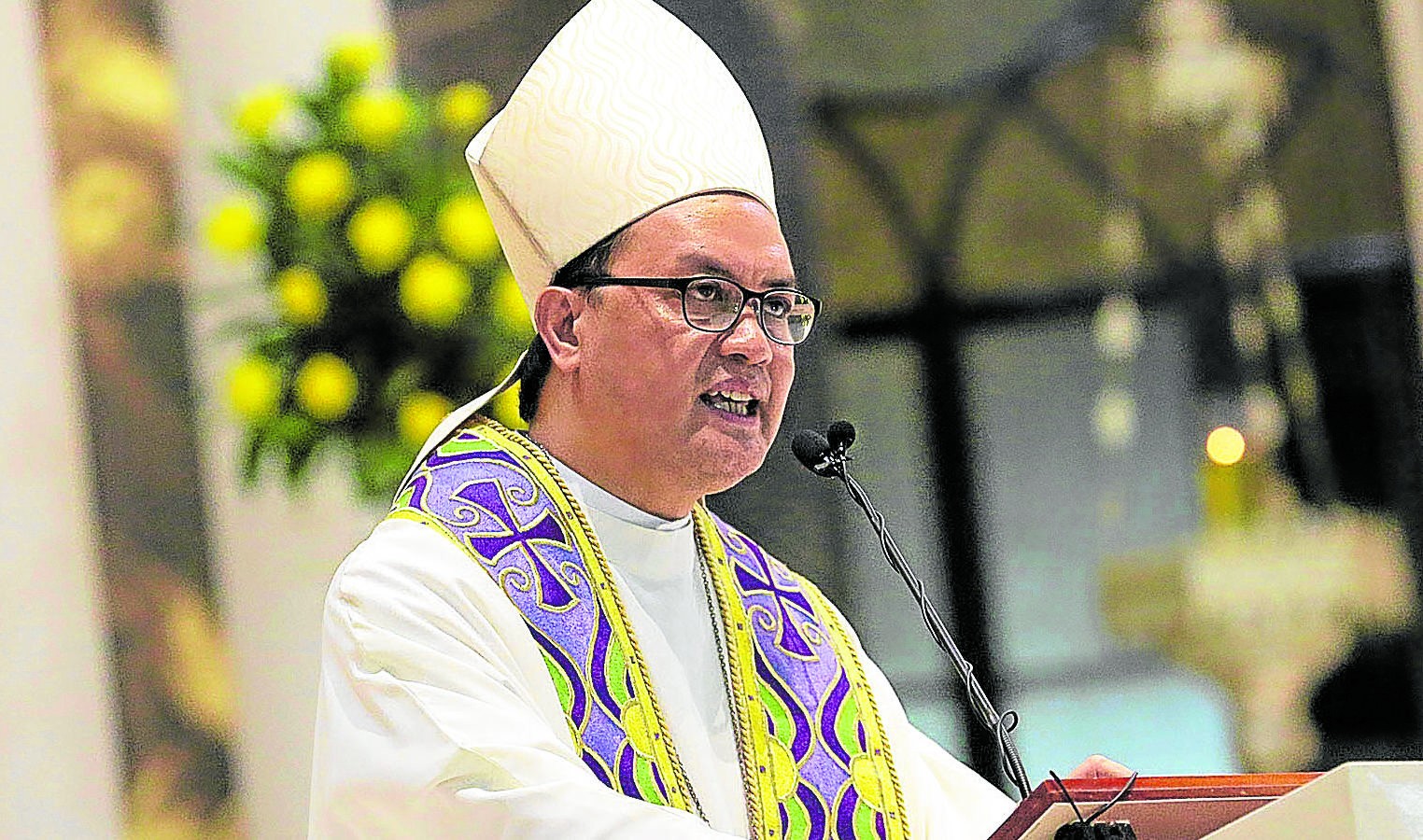Drug war critic Bishop Ambo David new CBCP president

Caloocan Bishop Pablo Virgilio David. INQUIRER FILE PHOTO / GRIG C. MONTEGRANDE
Caloocan Bishop Pablo Virgilio David, a staunch critic of the administration’s brutal war on drugs and who was once threatened by President Duterte himself, was elected new president of the Catholic Bishops’ Conference of the Philippines (CBCP).
Bishops elected the 62-year-old prelate during their biannual plenary assembly on Thursday. The CBCP also elected Pasig Bishop Mylo Hubert Vergara, 58, as its new vice president.
David—“Bishop Ambo’’ to his parishioners—will officially assume the position on Dec. 1 for a two-year term, succeeding outgoing CBCP president Archbishop Romulo Valles of the Archdiocese of Davao.
David had been one of the earliest and most outspoken Church leaders to assail how the Duterte administration’s approach to solving the drug menace through police actions that have killed thousands of suspected drug users and small-time drug peddlers, most of them in the poorest slums.
The questionable raids and arrests—with the killings always justified by police claims that the suspects were shot because they fought back (“nanlaban”)—have reaped condemnation from religious groups, civil society and local and international human rights watchdogs. Former International Criminal Court (ICC) prosecutor Fatou Bensouda, before she stepped down last month, requested The Hague-based court to open a formal investigation into the drug killings for crimes against humanity.
Article continues after this advertisement‘Who is the enemy?’
As early as 2017, about a year after President Duterte assumed power, David asked: “[H]as our government identified even just one of the cartels here in our country? If this is a war, who is the enemy? Why is it that only the poor or ordinary people end up being the victims?”
Article continues after this advertisementDavid once disclosed that he had been receiving death threats after the President, angered by the criticism, repeatedly suggested in public speaking engagements that criminals kill or rob bishops.
In November 2018, Mr. Duterte alleged that a certain “Bishop David’’ stole Church donations and may have been involved in drugs. “David! I’m beginning to suspect why you’re frequently roaming at night. You could be into drugs,’’ he said in a speech in Davao City.
While the President did not give the full name of the bishop, David said he was the only David in the current roster of the CBCP. The prelate laughed off the accusation, saying he was never into drugs—not even maintenance drugs—but only fruit shakes and vitamins. He maintained that he was only helping rehabilitate drug addicts.
In February 2019, David again revealed that death threats continued to hound him, forcing him to cancel an appearance at De La Salle University where he was to receive the Ka Pepe Diokno Human Rights Award.
The Caloocan bishop received encouragement from Pope Francis, who told him he was praying for him.
‘Killing field’
David had described his diocese—consisting of the cities of Caloocan, Malabon and Navotas—as a “killing field” of the Duterte drug war as many of the shootings involving the police or motorcycle-riding gunmen targeting drug suspects happened in his jurisdiction.
Among those killed by the police in Caloocan was 17-year-old Kian de los Santos, who was shot dead while handcuffed and begging for his life and maintaining his innocence during antidrug operation in August 2017. In November the following year, three officers were put on trial and convicted of the teenager’s murder—the first and only case decided in court so far out of the thousands of drug war killings on record.
David led a support group for families who lost members in the drug war, providing livelihood programs for the widows, scholarships for the orphans, and a chance for drug users to undergo rehabilitation.
In 2019, Ateneo de Manila University recognized the bishop’s efforts, conferring him with its Bukas Palad Award “for his courage in speaking out against the evil of injustice and violence.”
Times of darkness
In his message at the 122nd CBCP plenary assembly, Valles spoke about the current pandemic—“the times of darkness, of misery and suffering, times of terrible sickness and death.’’
He said the Philippines had lost two bishops—Patricio Alo of Mati and Antonio Palang of the Apostolic Vicariate of San Jose, Occidental Mindoro— while a number of bishops and priests had also been stricken with COVID-19.
“Sad memory indeed, but the fuller grim picture of this pandemic will take more time to unfold and to be told. This memory can easily envelop us, capture our hearts and minds and lead our spirits into a kind of practical hopelessness and desperation,” Valles said.
He prayed for a stronger “faith,” as he quoted Pope Francis in saying that “a strong memory guarantees a secure future.”
“I would like to believe that the Church in the Philippines tried her best, through us bishops, our clergy and religious, our lay leaders,” he added.
Valles said the Church continued to thrive despite its “many limitations” by helping in the humanitarian efforts for Filipinos most affected by the pandemic and the ensuing lockdowns. He cited the distribution of food packs to the poor through the parishes, the setup of community pantries, and the use of church venues as vaccination sites. —With a report from Inquirer Research